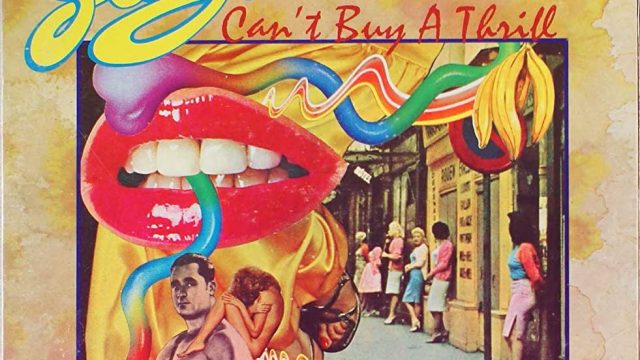Believe it or not, I’ve never smoked pot. I didn’t have a cool stoner uncle who introduced me to “the Dan.” I didn’t realize what the band’s name was a reference to until I read the book. I am, in fact, the kind of hopelessly uncool person who listens to Can’t Buy a Thrill and Pretzel Logic decades after the band’s peak who never would have fit in with the smoke-filled cocktail parties evoked by their jazz-influenced sound.
But I still like the band.
Blame it on my childhood. I can’t say for sure if I was riding in the back of my parents’ bright red Plymouth Horizon with no AC and roll-down windows, but it sure feels like I was, probably reading a book, as I normally did before I learned to drive. What I remember is the lyrics. You’ve been telling me you were a genius since you were seventeen./In all the time I’ve known you, I still don’t know what you mean. I remember I found it funny, and my mother didn’t, and my dad probably didn’t either, because I remember feeling quite alone in the world. Neither of them particularly liked Steely Dan, as I recall.
Getting that sly, wry insult when the adults in my life didn’t was the path to a lifetime of my parents only rarely laughing at the same jokes I did; at the time, though, it felt thrillingly adult, and it made me feel quite clever. Even now, I love the world-weary sleazeball who is the typical perspective character of a Steely Dan song. He’s ridiculous, but he kind of knows it too — ; a wannabe playboy without the guts or charm to pull it off. Can’t Buy a Thrill was Steely Dan’s debut album, and though it’s not as jazzy or not-perfect as their later work would become, it starts off just as assured as some of their best. The first track, “Do It Again,” is crisp, sensual, and as solid a portrait of self-defeat as can be crafted in just under six minutes. Listening to the album in 2020, it’s hard to believe that lead singer, songwriter, and general weirdo Donald Fagen was so uncertain of his vocal talent that he pulled in David Palmer to sing a good half of the songs and had percussionist Jim Hodder sing lead on “Midnight Cruiser.” Fagen’s vocals are reedy and gentle; you almost find him trustworthy, even as he lays down a scathing insult or tries to pick up a young woman half his age.
Track two, “Dirty Work,” is a decent song, but it’s not what we think of as a Steely Dan song any more. Palmer’s lead vocal is longing and defeated, the lyrics are a bit too straightforward, and it just doesn’t sound quite right. Rumor has it the label forced the song onto the album to make it sound more commercial, which…yeah, that tracks. Still, it’s haunting, and the chorus gets stuck in my head at the weirdest times. (There have been several successful cover versions, including those by the Pointer Sisters and Melissa Manchester, and Steely Dan’s female backup singers sometimes performed the song live after Palmer left the band.)
There are more hints of the band Steely Dan would become on side one: the narrator describing himself as a “gentleman loser” in “Midnight Cruiser,” the cocktail-hour charm of Fagen’s vocals in “Only a Fool Would Say That.” But the next standout doesn’t happen until you take the record off the turntable and flip it over.
Side two begins with “Reelin’ in the Years,” the song with that perfect little couplet that caught my ear so many years ago. Fagen has called “Reelin’” “dumb but effective,” which is about right, but it’s another track that starts with absolute confidence. Steely Dan was famous — often infamous — for the crackerjack perfection Becker and Fagen demanded from their musicians, and “Reelin’” is sharp and perfect, from that percussive piano line to Elliot Randall’s guitar solo (Jimmy Page has called it his favorite of all time). Another tale of a love affair gone wrong — and another relationship where the woman in the pair holds all the cards — its wryly moping lyrics and bouncy, jazzy sound are classic Steely Dan. “Fire in the Hole” is looser and less jazzy, and its mopiness is familiar to anyone who’s made it this far. In fact, by this time, Palmer’s voice is an unsettling fit for “Brooklyn (Owes the Charmer Under Me).” “Change of the Guard” is fine, and “Turn that Heartbeat Over Again” has hints of what’s to come later, both musically and thematically (it reminds me a little of one of my favorite B-sides, “Any Major Dude”).
In all, Can’t Buy a Thrill is exactly what you’d expect Steely Dan’s first album to be: imperfect and ugly at times (let’s not even talk about the album cover), but with an undeniable confidence and strength that would find maturity in the band’s later years. They spent a lot of money and they spent a lot of time. It paid off.


